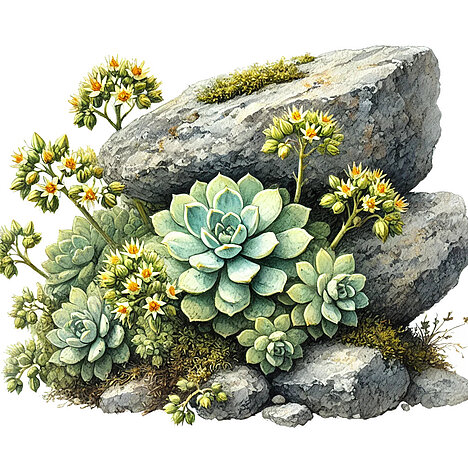Sedum

If you have a green thumb and a loyal four-legged friend by your side, you may be wondering how the world of plants relates to your dog's health and well-being. One plant that is often found in gardens and on balconies is sedum, also known as stonecrop. This in-depth article looks at what exactly sedum is and examines the pros and cons of this plant in relation to our four-legged friends.
What is sedum?
Sedum, often known as stonecrop, is a genus of succulents comprising over 600 species. These plants are popular because of their undemanding care, drought tolerance and diverse shapes and colors. Sedum species thrive in a range of environments, from indoor spaces to rock gardens, and are often used in green roofs because of their hardiness and low maintenance requirements.
Advantages of sedum near dogs
Non-toxicity
One of the most important benefits of sedum around dogs is its non-toxicity. Most sedum species are considered safe for dogs, making them an excellent choice for households where the curiosity of the four-legged members knows no bounds.
Aesthetics and calming
The aesthetic variety of Sedum can also help to calm and soothe dogs by creating a calm and naturalistic environment. The presence of plants in the home can have a calming effect on pets, much like it does on humans.
Air purification
Some sedum species can help improve air quality by absorbing small amounts of pollutants. Cleaner air promotes the health of both dogs and their owners.
Disadvantages and precautions
Risk of injury
Although Sedum is not poisonous, sharp-edged leaves or stems, especially on larger species, can cause injury to the mouth or paws of curious dogs. It is advisable to keep plants with potentially harmful textures out of reach.
Excessive interest
Some dogs show an excessive interest in plants, which can lead to digestive upset if they ingest parts of the plant. Although sedum is not toxic, it is important to make sure that your dog does not regularly consume parts of the plant.
Allergic reactions
Rarely, dogs can have individual allergic reactions to certain plants, including sedum. Watch out for signs of allergies, such as excessive scratching, reddening of the skin or breathing difficulties.
Sedum offers a delightful addition to your garden or home without having to worry about your dog's safety. The benefits of this diverse plant genus, such as its non-toxicity and aesthetic qualities, far outweigh the few precautions you should take. By creating a harmonious environment for all the inhabitants of your household, you promote the well-being of your four-legged friend while enjoying the beauty and diversity of nature. However, it is always important to keep a watchful eye on your dog's behavior and take appropriate measures when necessary to ensure his safety and health.
If you notice any signs of hypersensitivity or poisoning in your dog, you should see your vet immediately. We are not a substitute for a vet, but we try to be as accurate as possible. Every dog reacts differently and we recommend you get a second opinion or consult your vet if in doubt.
Stay healthy and take good care of your four-legged friend!😊